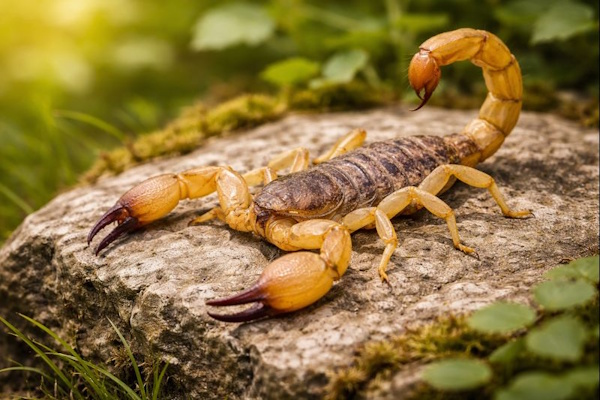Distribution & First Aid
Scorpions are widespread in Greece, but for most holidaymakers they do not pose a serious danger. Nevertheless, it is worth knowing where they occur, how to recognize a sting, and which first aid measures are useful.
1. Where in Greece Do Scorpions Occur?
Scorpions prefer warm, dry areas. They are particularly common in:
-
Peloponnese: in rural and rocky regions
-
Crete: dry coastal areas and olive groves
-
Ionian Islands: Lefkada, Zakynthos and Kefalonia
-
Cyclades: especially Naxos and Paros

Scorpions often hide during the day under stones, in wall cracks, wood piles or under old tree trunks. At night they are active and hunt small insects. Most species are not life-threatening to humans, but their stings can be painful.
Our Tip
Hotels in Greece are best booked via Booking.com: large selection from guesthouses to resorts, real guest reviews, flexible (often free) cancellation and fair prices.
2. Which Scorpions Are Dangerous in Greece?
There are many species. The most common species in Greece include:
-
Euscorpius italicus: small, barely venomous, sting usually causes only local pain
-
Mesobuthus gibbosus: medium-sized, can cause stronger pain and swelling
-
Mesobuthus cyprius (rare on Crete and Cyclades): more potent venom, medical treatment is recommended
In general, children, older people, or people with allergies are at greater risk than healthy adults.
3. First Aid for Scorpion Stings
If a scorpion sting occurs, the following steps are useful:
-
Stay calm – panic worsens symptoms
-
Clean the sting site – with water and soap
-
Cool – apply ice or cool compresses to the site to reduce swelling and pain
-
Pain relief – paracetamol or ibuprofen if necessary
-
See a doctor – immediately for children, elderly people, or severe symptoms such as difficulty breathing, whole-body swelling or severe malaise
-
Identify the scorpion – if possible, take a photo or safely collect the animal (only with gloves) to show the doctor the species
Most stings are harmless, but visiting a doctor is advisable.

4. Tips to Avoid Scorpion Stings
-
Avoid light sources at night that attract insects
-
Shake out shoes and socks before putting them on
-
Check tents and beds in rural areas
-
Regularly clean gardens, terraces, and stone piles
-
Be careful when reaching into dark corners
Scorpions are a natural part of Greek flora and fauna. For most holidaymakers, there is hardly any danger as long as some simple precautions are taken. In the event of a sting, a quick visit to the doctor is recommended.